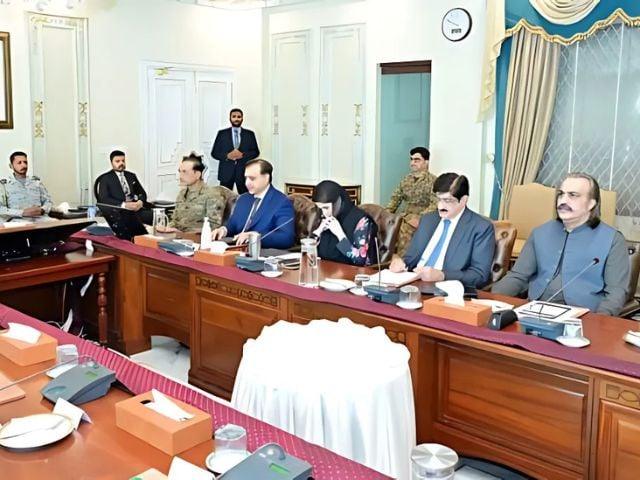Prime Minister Muhammad Shehbaz Sharif on Thursday condemned India’s unilateral suspension of the Indus Waters Treaty (IWT) and called it an “obvious violation” and an act of “water aggression” that will receive a resolute response.
Sharif was chairman of a high -level meeting on water safety and warned that any threat to Pakistan’s wandering rights would be met during national security decisions made on April 24.
He compared the water to a struggle for justice and promised unity in the light of growing regional tensions.
The high-level meeting attended the Deputy Prime Minister and Foreign Minister Ishaq Dar, Field Marshal Coas-General Syed Asim Munir, federal ministers, chief ministers for all four provinces, Prime Minister of Azad Jammu and Kashmir, chief minister of Gilgit-Baltist and senior federal and provincial officials.
“This is a struggle for justice, and like every struggle we have struggled with unity, we will defeat India’s water aggression with determination and wisdom,” said the Prime Minister.
He emphasized that live nations confront challenges head-on and make strategic, lasting decisions to protect their future generations.
Shehbaz Sharif said that India’s alleged attempts at arms water are to intensify, and emphasized a binding international attempt at weapon water to be a signer to leave a signing water to be a signing water that has been adopted, and stressed with a meeting at water safety in water safety in the prime minister
He described India’s attitude as “political and legal gap.”
The meeting was characterized by a unified political front, with all four provincial chief ministers, the Prime Minister of Azad Jammu and Kashmir, and the chief minister of Gilgit-Baltist refuses what they called Indian threats.
The Prime Minister welcomed this collective reaction and called it “a reflection of our collective national decision to protect Pakistan’s water safety.”
In response to the situation, the Prime Minister instructed the formation of a high -level committee under Vice Prime Minister Ishaq Dar.
Read more: Modi says Pakistan doesn’t get water from Indian-controlled rivers
The body has been tasked with devising financing strategies for new dam projects and includes representation from all provinces, AJK and relevant federal ministries. The committee has been asked to present its conclusions within 72 hours.
“We will prioritize the construction of non-controversial reservoirs. No matter where there is unanimity, we must act without delay.
These dams are not political-they are a national necessity, ”said the prime minister. He made it clear that any project with cross-provening consensus will be quickly traced and completed on a priority basis.
A technical briefing during the session Detailed Pakistan’s current water storage capacity and ongoing projects. The Diamer-Bhasha Dam is scheduled for completion in 2032, while the Mohmand Dam is expected to end in 2027.
ALSO READ: Pakistan Warns India: Don’t Weapon Water
Pakistan currently has 11 operational dams with a cumulative capacity of 15,318 million acre feet. Under the development program for the public sector, 32 dams are under construction, and 79 other projects are underway through annual development schemes.
Shehbaz Sharif highlighted infrastructure challenges drew Shehbaz Sharif attention to the accumulation of sediment in existing dams such as Tarbela and Mangla, which has reduced their efficiency seriously. He urged management to make bold choices and warned that future generations would judge them for inaction.
“We owe our 240 million people to act resolutely. This is not about politics – it is about survival. The future generations must remember this leadership with respect for the choices we make today,” he declared.
Read: Pakistan will never accept Indian Hegemony, says Field Marshal Munir
The prime minister also praised the efforts of financial and economic affairs ministries as well as key officials for securing loans from the World Bank and the Asian Development Bank. He claimed that the Indian lobbying efforts on derailing Pakistan’s financing plans on ADB had failed.
“India tried to sabotage our projects at ADB for three days, but failed. Our diplomatic victory is a testimony to Pakistan’s principle stand and growing credibility,” he noted.
As the meeting ended, Shehbaz Sharif repeated confidence in the solidarity of Pakistan’s political and military leadership. “Just as our brave armed forces were stuck on the battlefield, we must now be united to secure every drop of water for our people,” he said.
Among those present at the meeting was Deputy Prime Minister Ishaq Dar; Chief of Army Staff Field Marshal General Syed Asim Munir; Defense Minister Khawaja Muhammad Asif; Planning Minister Ahsan Iqbal; Law Minister Azam Nazir Tarar; Minister of Information Attaullah Tarar; Minister of Power Owais Leghari; Water Resources Minister Muneeb Wattoo; and other senior federal officials.
Read: Doesn’t allow India to cross IWT Red Line: PM
Chief ministers Maryam Nawaz (Punjab), Murad Ali Shah (Sindh), Ali Amin Gandapur (Khyber-Pakhtunkhwa) and Sarfraz Bugti (Balochistan) also participated with AJK-Prime Minister Anwarul Haq and GB chief minister Gulbar Khan.



